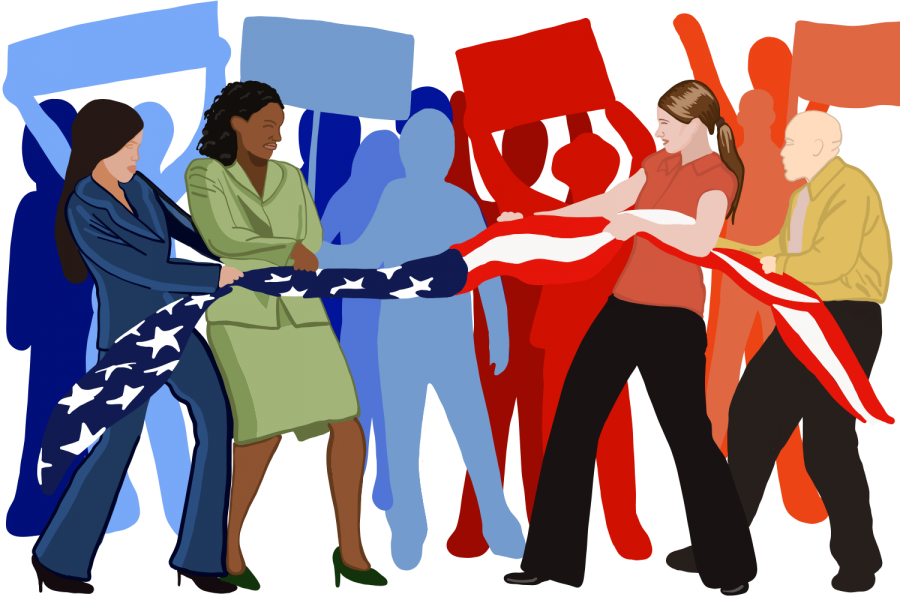Divided states of America
Political parties limit solutions for problems in the world
January 30, 2019
It ruins families. It ruins friendships. It causes arguments at the workplace. It surrounds us in everything we do on a daily basis. It’s called politics.
We are not supposed to talk about politics at family gatherings and we often remain silent when any discussion that is even semi-political comes up.
We no longer can speak our opinions without offending someone.
Almost all political discussions end up in useless and divisive bickering that serves no purpose except to boost one’s ego.
That’s the unfortunate reality of American politics in the 21st century.
It shouldn’t be this way, but that’s what it has become. Even politicians know this and use this to their advantage on a daily basis by initiating this divisive rhetoric to then later present themselves as the solution in an attempt to keep hold of the power that they currently possess. This way of political thinking is often referred to as identity politics and is a widespread epidemic in today’s culture.
Despite there being multiple parties, America is essentially a two-party system between the Democrats and the Republicans. Democrats focus mainly on social issues and typically advocate for more government intervention. Republicans focus more on business and typically advocate for less government intervention.
While labeling someone as Democrat or Republican is a quick way to describe what a person’s political beliefs are, George Washington had it right when he warned against the formation of political parties.
In his farewell address on Sept. 17, 1796, Washington said, “However [political parties] may now and then answer popular ends, they are likely in the course of time and things, to become potent engines, by which cunning, ambitious, and unprincipled men will be enabled to subvert the power of the people and to usurp for themselves the reins of government, destroying afterward the very engines which have lifted them to unjust dominion.”
Political parties cause more division than unity as they also provide an easy way for ignorant citizens to vote by straight-ticket voting—when a voter votes for all of the candidates from their party. By doing this, the voter shows that they are more dedicated to their party than to America.
Now, just because you vote for all Democrats or all Republicans, it does not mean that you are an ignorant voter, but you cannot go in to vote with the mindset of “we have to keep the other side out of office.” This is a huge tool of propaganda that is used by both Democrats and Republicans alike. Both parties brainwash potential voters by trying to convince them that the opposing party is the enemy rather than teaching them to work with the other party to come up with meaningful solutions.
A good example of this can be seen with the dispute over the potential southern border wall. Democrats convince their supporters that Republicans are heartless people who don’t care about the well-being of immigrants which is simply not the case. Republicans try to fear monger their supporters into believing that if we don’t build a wall, terrorists will flood into our country and cause mayhem and that the Democrats don’t care about the safety of the American people. These emotional appeals are effective, but often lead people further away from the truth.
Instead of regurgitating the same dogma that we’re spoon fed by the media, we need to think for ourselves by using our own logic and reasoning skills. We need to evaluate the needs of the country. Don’t just focus on policies or stances on hot button issues, but focus on what the country is lacking. Right now, our country is more divided than ever. Hatred and prejudice fill the media and our political figures seem to do nothing but feed the fire. However, if we focus too much on partisan policies, we never actually solve the significant dilemmas that are plaguing this country. It is as if we are bleeding out of one leg, yet we are occupied with a tiny scratch on our elbow; it’s irrational.
Lastly, when we get into political debates with our peers, we so often turn it into a competition of wit. Instead of attempting to understand opposing viewpoints, we come into an argument in an attempt to win the argument rather than to have important, deep, intellectual dialogue. We need to listen and truly understand where someone else is coming from. We need to discuss what we have in common and then go into explaining where our views differ and why we believe what we believe without making it personal. Having an open and honest dialogue is the only way that we can come up with solutions that benefit everyone.
















Tim Strebeck' • Feb 1, 2019 at 5:58 pm
Great article. Very well written and on target.
Bill Chandler • Jan 31, 2019 at 8:16 pm
Very good article most everything can be solve with a little common sense but that requires dialogue and now days people talk but don’t listen.
Harold Whinery • Jan 31, 2019 at 12:08 pm
Very impressed by the article. Both the general writing, and the facts addressed, are very thorough. I will pass this around. Thank you.
Don Whinery • Jan 31, 2019 at 5:53 am
That is exactly how I feel, so how do we turn things back to the future and ramp down the rhetoric and ramp up LOVE.?
Joe • Jan 30, 2019 at 11:45 pm
Love the article. A lot of truth in there. Divide and conquer is how the elite rule over us. Too bad we can’t just have small disagreements anymore. Now we are forced to choose, left or right. In this duopoly there is no other choice.